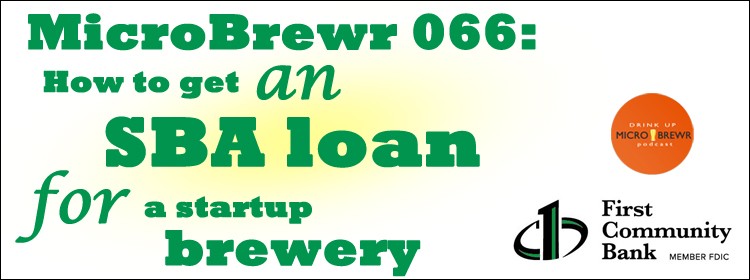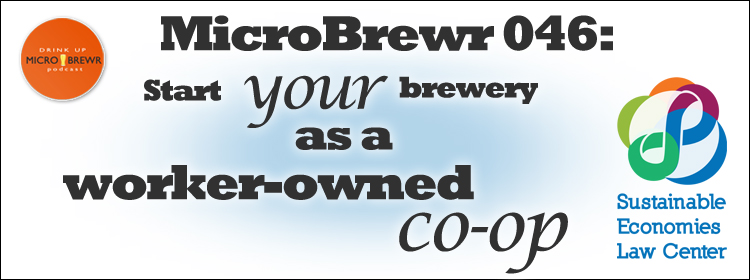MicroBrewr 066: How to get an SBA loan for a startup brewery
Podcast: Play in new window | Download | Embed
Subscribe: RSS
Kris Kennedy works in the Small Business Lending Group with First Community Bank in Roseville, California. They were the first financial institution listed as an allied trade member of California Craft Brewers Association.
The U.S. Small Business Administration’s loan program makes it easier for small businesses to get funding from traditional lending institutions. Kris teaches us how to get an SBA loan for a brewery.
All participating banks must go by the SBA guidelines. There are typically 5 criteria to judge worthiness for a loan:
- Cash flow – This could be historical or projected. Can you repay the debt?
- Economic environment of the industry – Also includes changes to the industry such a new regulations or supply issues.
- Collateral – Can include business assets and personal real estate.
- How much the borrower is investing – They typically require 20-25% for startups.
- Character – They check your credit score including public records such as judgments and liens. Credit score must be at least 680.
Loan funds can be used for a variety of things. Eligible expenditures include:
- Operating equipment
- Real estate
- Tenant improvement to real estate
- Construction of a new building
- Refinancing for business debt
- Purchase of an existing business
- Working capital
Loan amounts can range from $350,000 to $5 million dollars. Loans are offered in 10-year and 25-year terms. They’re fully amortized, meaning that the monthly payment will be the same through the life of the loan. There’s usually no pre-payment penalty after the first 3 years.
Kris says the ideal candidate should have experience working in a commercial brewery. Planning on opening a brewpub, have restaurant or hospitality experience. Basically, show that your past experience applies to running a brewery.
If you’re a homebrewer wanting to get an SBA loan, it could help to have awards for your beer. So start entering in contests!
Lastly, Kris says, it’s good to work with a lender that has experience in the industry. If you’re in California, Arizona, Nevada, Washington, or Oregon, and you need funds to start or expand a brewery, get in touch with Kris.
“Not every startup is something that a lender is going to be able to finance.” [Tweet This]
Listener question:
From Josh Button: How much business experience should I have? What kind of experience or education would you ecommend?
Book recommendation:
- The Umami Factor: Full-Spectrum Fermentation for the 21st Century by Robert Rivelle George.
Check out the entire list of recommended books, click here.
An upcoming beer style:
Pale ale
Other resources:
- Allied Trade Members, California Craft Brewers Association.
- SBA Lending, First Community Bank.
- Brewers finding it easier to access capital, Eric Gneckow, The North Bay Business Journal, February 10, 2014.
- Turns Out, Uncle Sam Is a Beer Lover, Darren Dahl, Inc. Magazine, June 2013.
- New Glarus tapped SBA resources from start, Jeff Engel, Milwaukee Business Journal, June 14, 2013.
- SBA 100 Dogfish Craft Brewery, U.S. Small Business Administration.
You can reach Kris Kennedy and First Community Bank at:
- www.fcbconnect.com
- Email: kkennedy [at] fcbconnect [dot] com
- Phone: 916-740-1563
Sponsor:
Support MicroBrewr
Help keep MicroBrewr on the air. CLICK HERE for ways you can help.






